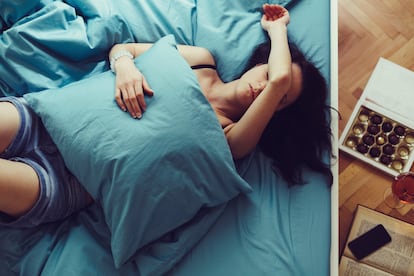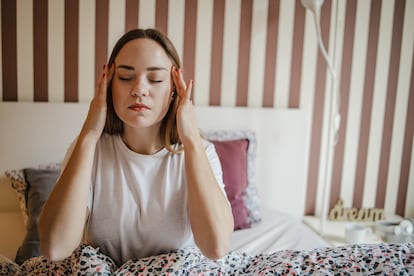‘Hangxiety’: When hangovers cause anxiety
While the term is relatively new, we have been experiencing this problem all our lives, and it is not invented: the biochemical and psychological effects of having a few too many drinks do cause a malaise


A 2019 article in The Guardian put the word hangxiety — a portmanteau of the words hangover and anxiety — on the map. The pithy term quickly became popular in WhatsApp groups and on social media feeds, often accompanied by the “Literally Me” meme. No one had ever given such a specific name to that mixture of headache, palpitations, restlessness and a deep sense of guilt and malaise caused by the previous night’s excessive drinking. It’s not just a simple hangover; it’s much worse. Since we live in an age in which the word “anxiety” can be attached to just about anything that comes up, making this emotion much more specific and enabling it to develop into a disorder — from eco-anxiety to fascist anxiety — it is worth asking whether a hangover can actually cause anxiety. “The answer is yes, hangxiety is real,” Joaquín T. Limonero, the president of the Spanish Society for the Study of Anxiety and Stress and coordinator of the stress and health research group at the Autonomous University of Barcelona, told EL PAÍS. Since that is the case, what causes it?
“It is a combination produced by the brain’s biochemical alterations, stemming from the consumption of alcohol, and certain psychological factors.” As the psychologist explains, alcohol acts on the most important inhibitory neurotransmitter, GABA, which is responsible for sending chemical messages from the brain to the nervous system; “It is the part of the brain most linked to decision-making [and] planning and it is also where emotions are made conscious.” Limonero adds that “alcohol stimulates GABA. That’s why you relax, calm down and have fun when you drink.” With one drink, everything is fine. But with two or three drinks, things start to get out of control: there’s a decrease in glutamate, the main excitatory transmitter in the brain. “More glutamate means more anxiety. Less glutamate means less anxiety.” It’s simple, pure chemistry. The problem is that, the next day, when the sun comes up, there is a rebound effect: “The brain seeks to regulate itself and regain normal functioning levels, so it decreases GABA neurotransmitters and increases glutamate.” This activation of glutamate is what produces that feeling of anxiety.
But there are more factors at play beyond the imbalance between GABA and glutamate, such as raised cortisol levels. “Alcohol interrupts the natural cycle of cortisol, a hormone that increases naturally during the day and alerts us to possible threats, and is reduced at night,” the psychologist explains. This hormone is commonly related to stress, since it stimulates our glucose production, and when our body detects some kind of danger, it stops the absorption of glucose and starts producing energy. As it decompensates after the consumption of alcohol, anxiety increases because we are “more vigilant, more active and more tense.” Hydration levels also impact hangxiety. “Another factor that influences this feeling of anxiety is dehydration: we know that alcohol dehydrates and decreases the concentration of water in the body, which often causes us to wake up with a headache.” But our heart must also work harder because of that dehydration. Another symptom of anxiety? Palpitations. In addition, the psychologist says, “we have to add lack of sleep: when we drink alcohol, we sleep worse.” That lack of sleep also causes tiredness and irritation. In other words, it is conducive to anxiety.
In addition, we cannot neglect to mention other psychological factors. For instance, there’s the guilt and regret that arise from that feeling of not knowing what exactly we did the night before, whether we made a fool of ourselves, or crossed a line by making an inappropriate joke with someone from work over Christmas drinks, or sent a message to an ex. “We have blurred memories of the night before, which can lead to a state of agitation caused by uncertainty and regret: ‘What will they think of me?’” explains Limonero. The psychologist adds that context is important: getting drunk with friends is not the same as doing so with coworkers. When in doubt, it’s better not to drink too much.

The problem of hangxiety has an easy solution: don’t drink. Period. But let’s be realistic, especially at Christmas. “Remember that it is temporary, like the hangover itself, which can last a few hours or a couple of days,” says the psychologist. He also recommends consulting a mental health specialist if we experience prolonged anxiety over time. If we already have an anxiety disorder, the best thing to do is to drink as little as possible, which will spare us trouble the day after.
As for the remedy, everyone and their mother has their own cure for a terrible hangover. Still, everybody agrees on one or more points: drink plenty of water, rest and, if necessary, take some medication to alleviate the headache. Is it advisable to take anxiety medication? “For me, that would be counterproductive,” says Limonero. He says that “the best thing is to hydrate, eat healthily even if one’s body is asking for junk food, take vitamin B and don’t consume caffeine, because it will key us up again, and we want to calm down.” That’s true for most things in life.
Sign up for our weekly newsletter to get more English-language news coverage from EL PAÍS USA Edition
Tu suscripción se está usando en otro dispositivo
¿Quieres añadir otro usuario a tu suscripción?
Si continúas leyendo en este dispositivo, no se podrá leer en el otro.
FlechaTu suscripción se está usando en otro dispositivo y solo puedes acceder a EL PAÍS desde un dispositivo a la vez.
Si quieres compartir tu cuenta, cambia tu suscripción a la modalidad Premium, así podrás añadir otro usuario. Cada uno accederá con su propia cuenta de email, lo que os permitirá personalizar vuestra experiencia en EL PAÍS.
¿Tienes una suscripción de empresa? Accede aquí para contratar más cuentas.
En el caso de no saber quién está usando tu cuenta, te recomendamos cambiar tu contraseña aquí.
Si decides continuar compartiendo tu cuenta, este mensaje se mostrará en tu dispositivo y en el de la otra persona que está usando tu cuenta de forma indefinida, afectando a tu experiencia de lectura. Puedes consultar aquí los términos y condiciones de la suscripción digital.








































